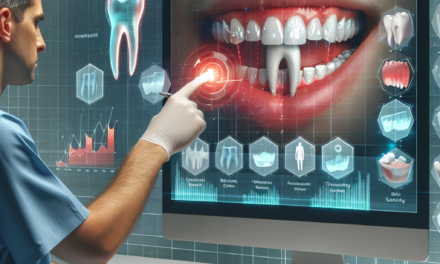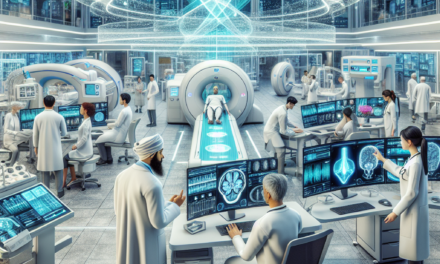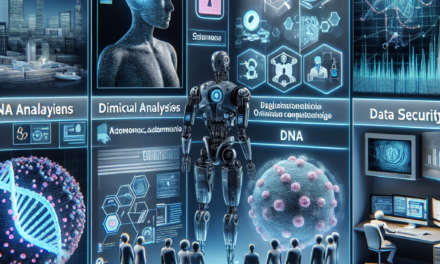Innovative Technologies Shaping Digital Therapeutics for Mental Health Care
The landscape of mental health care is undergoing a significant transformation, driven by the advent of innovative technologies. Digital therapeutics (DTx) are emerging as a powerful tool in the treatment of mental health disorders, offering new avenues for patient engagement, monitoring, and intervention. This article explores the various technologies shaping digital therapeutics for mental health care, focusing on five key areas: mobile applications, artificial intelligence, virtual reality, teletherapy, and data analytics. Each section will delve into the current state of these technologies, their applications, and the implications for mental health care.
1. Mobile Applications: The Rise of Mental Health Apps
Mobile applications have revolutionized the way individuals access mental health resources. With the proliferation of smartphones, mental health apps have become increasingly popular, providing users with tools for self-management, therapy, and support.
Accessibility and Convenience
One of the primary advantages of mobile applications is their accessibility. Users can access mental health resources anytime and anywhere, breaking down barriers associated with traditional therapy. This convenience is particularly beneficial for individuals who may face stigma or logistical challenges in seeking help.
- 24/7 availability of resources
- Anonymity for users
- Cost-effective alternatives to traditional therapy
For instance, apps like Headspace and Calm offer guided meditations and mindfulness exercises that users can engage with at their own pace. These tools can be particularly effective for individuals dealing with anxiety and stress, providing immediate relief and coping strategies.
Evidence-Based Interventions
Many mental health apps are designed based on evidence-based therapeutic approaches. Cognitive Behavioral Therapy (CBT) is a common framework utilized in various applications. For example, Woebot is an AI-driven chatbot that employs CBT techniques to help users manage their mental health. Research has shown that users of Woebot report significant reductions in symptoms of anxiety and depression.
Challenges and Limitations
Despite their benefits, mobile applications also face challenges. The lack of regulation in the app market can lead to the proliferation of ineffective or harmful products. Additionally, user engagement can be inconsistent, with many individuals downloading apps but failing to use them regularly.
- Quality control and regulation issues
- Potential for user disengagement
- Privacy concerns regarding data security
To address these challenges, developers must prioritize user experience and ensure that their apps are grounded in scientific research. Collaborations with mental health professionals can enhance the credibility and effectiveness of these tools.
2. Artificial Intelligence: Transforming Mental Health Diagnostics and Treatment
Artificial intelligence (AI) is making significant strides in mental health care, offering innovative solutions for diagnostics, treatment personalization, and patient monitoring. AI technologies can analyze vast amounts of data to identify patterns and predict outcomes, enhancing the overall quality of care.
AI in Diagnostics
AI algorithms can assist in diagnosing mental health conditions by analyzing speech patterns, facial expressions, and even written text. For example, researchers have developed AI systems that can detect signs of depression through analysis of social media posts. By identifying linguistic cues and emotional tone, these systems can flag individuals who may benefit from further evaluation.
Personalized Treatment Plans
AI can also facilitate the creation of personalized treatment plans. By analyzing patient data, including medical history and response to previous treatments, AI systems can recommend tailored interventions. This approach not only improves treatment efficacy but also enhances patient satisfaction.
Monitoring and Support
AI-powered chatbots and virtual assistants can provide ongoing support to individuals managing mental health conditions. These tools can check in with users, offer coping strategies, and alert healthcare providers if a patient is in crisis. For instance, the chatbot Replika allows users to engage in conversations that can help alleviate feelings of loneliness and anxiety.
Ethical Considerations
While AI holds great promise, it also raises ethical concerns. Issues related to data privacy, algorithmic bias, and the potential for over-reliance on technology must be addressed. Ensuring that AI systems are transparent and equitable is crucial for maintaining trust in mental health care.
- Data privacy and security concerns
- Potential for bias in AI algorithms
- Need for human oversight in AI applications
As AI continues to evolve, it is essential for stakeholders to engage in discussions about ethical practices and the responsible use of technology in mental health care.
3. Virtual Reality: Immersive Experiences for Therapeutic Interventions
Virtual reality (VR) is emerging as a groundbreaking tool in mental health treatment, offering immersive experiences that can facilitate exposure therapy, relaxation, and skill-building. By creating controlled environments, VR allows patients to confront their fears and anxieties in a safe space.
Exposure Therapy
One of the most promising applications of VR in mental health care is exposure therapy for conditions such as post-traumatic stress disorder (PTSD) and phobias. VR can simulate real-life scenarios that trigger anxiety, enabling patients to gradually confront their fears. For example, a patient with a fear of flying can experience a virtual flight, allowing them to practice coping strategies in a controlled environment.
Relaxation and Mindfulness
VR can also be used to promote relaxation and mindfulness. Guided VR experiences can transport users to serene environments, helping them to practice mindfulness techniques and reduce stress. Programs like Oculus Venues offer users the chance to attend virtual concerts or events, providing a sense of community and connection that can be beneficial for mental well-being.
Skill-Building and Social Interaction
VR can facilitate skill-building for individuals with social anxiety or autism spectrum disorders. Virtual environments can provide opportunities for users to practice social interactions and develop communication skills without the pressure of real-world consequences. Research has shown that individuals who engage in VR social skills training report increased confidence and improved social interactions.
Challenges and Future Directions
Despite its potential, the use of VR in mental health care is not without challenges. The cost of VR equipment can be prohibitive, and not all patients may have access to the technology. Additionally, the effectiveness of VR interventions can vary based on individual preferences and experiences.
- High costs of VR technology
- Accessibility issues for certain populations
- Need for further research on long-term effectiveness
As technology advances and becomes more affordable, VR has the potential to become a mainstream therapeutic tool in mental health care. Continued research and collaboration between mental health professionals and technologists will be essential in maximizing its benefits.
4. Teletherapy: Bridging the Gap in Mental Health Care
Teletherapy has gained significant traction in recent years, particularly in response to the COVID-19 pandemic. This mode of therapy allows individuals to connect with mental health professionals remotely, providing a convenient and flexible alternative to traditional in-person sessions.
Increased Access to Care
Teletherapy has the potential to increase access to mental health care, particularly for individuals in rural or underserved areas. By eliminating geographical barriers, teletherapy enables patients to connect with qualified professionals who may not be available locally. This is particularly important given the shortage of mental health providers in many regions.
Flexibility and Convenience
Teletherapy offers flexibility in scheduling, allowing patients to attend sessions at times that work best for them. This convenience can lead to higher rates of attendance and engagement, as individuals are more likely to prioritize therapy when it fits into their busy lives.
Challenges and Limitations
While teletherapy offers numerous benefits, it also presents challenges. Technical issues, such as poor internet connectivity, can disrupt sessions and hinder communication. Additionally, some individuals may feel less comfortable discussing sensitive topics in a virtual setting compared to an in-person environment.
- Technical difficulties during sessions
- Potential for reduced therapeutic rapport
- Concerns about confidentiality and privacy
To address these challenges, mental health professionals must be trained in teletherapy best practices and utilize secure platforms that prioritize patient confidentiality. As teletherapy continues to evolve, it is essential to gather data on its effectiveness compared to traditional therapy methods.
5. Data Analytics: Harnessing Insights for Improved Mental Health Outcomes
Data analytics is playing an increasingly important role in mental health care, enabling providers to gather insights that can inform treatment decisions and improve patient outcomes. By analyzing data from various sources, including electronic health records and patient-reported outcomes, mental health professionals can identify trends and tailor interventions accordingly.
Predictive Analytics
Predictive analytics involves using historical data to forecast future outcomes. In mental health care, this can help identify individuals at risk of developing mental health conditions or experiencing relapses. For example, algorithms can analyze patterns in patient behavior and treatment adherence to predict potential crises, allowing for timely interventions.
Personalized Treatment Approaches
Data analytics can facilitate personalized treatment approaches by identifying which interventions are most effective for specific populations. By analyzing patient demographics, treatment history, and response to various therapies, providers can develop targeted strategies that enhance treatment efficacy.
Monitoring and Evaluation
Data analytics also plays a crucial role in monitoring patient progress and evaluating treatment outcomes. By collecting and analyzing data on symptom severity, treatment adherence, and patient satisfaction, mental health professionals can make informed decisions about adjusting treatment plans as needed.
- Improved patient monitoring and evaluation
- Enhanced understanding of treatment efficacy
- Data-driven decision-making in clinical practice
As data analytics continues to advance, it is essential for mental health providers to prioritize data security and ethical considerations. Ensuring that patient data is handled responsibly will be crucial for maintaining trust in the mental health care system.
Conclusion: The Future of Digital Therapeutics in Mental Health Care
The integration of innovative technologies into mental health care is reshaping the landscape of treatment and support. From mobile applications and artificial intelligence to virtual reality, teletherapy, and data analytics, these advancements offer new opportunities for improving patient outcomes and enhancing the overall quality of care.
As we move forward, it is essential for stakeholders to collaborate in addressing the challenges associated with these technologies. Ensuring that digital therapeutics are evidence-based, accessible, and ethically sound will be crucial for maximizing their potential benefits.
In summary, the future of mental health care lies in the successful integration of technology and human compassion. By harnessing the power of innovative technologies, we can create a more inclusive and effective mental health care system that meets the diverse needs of individuals seeking support.





